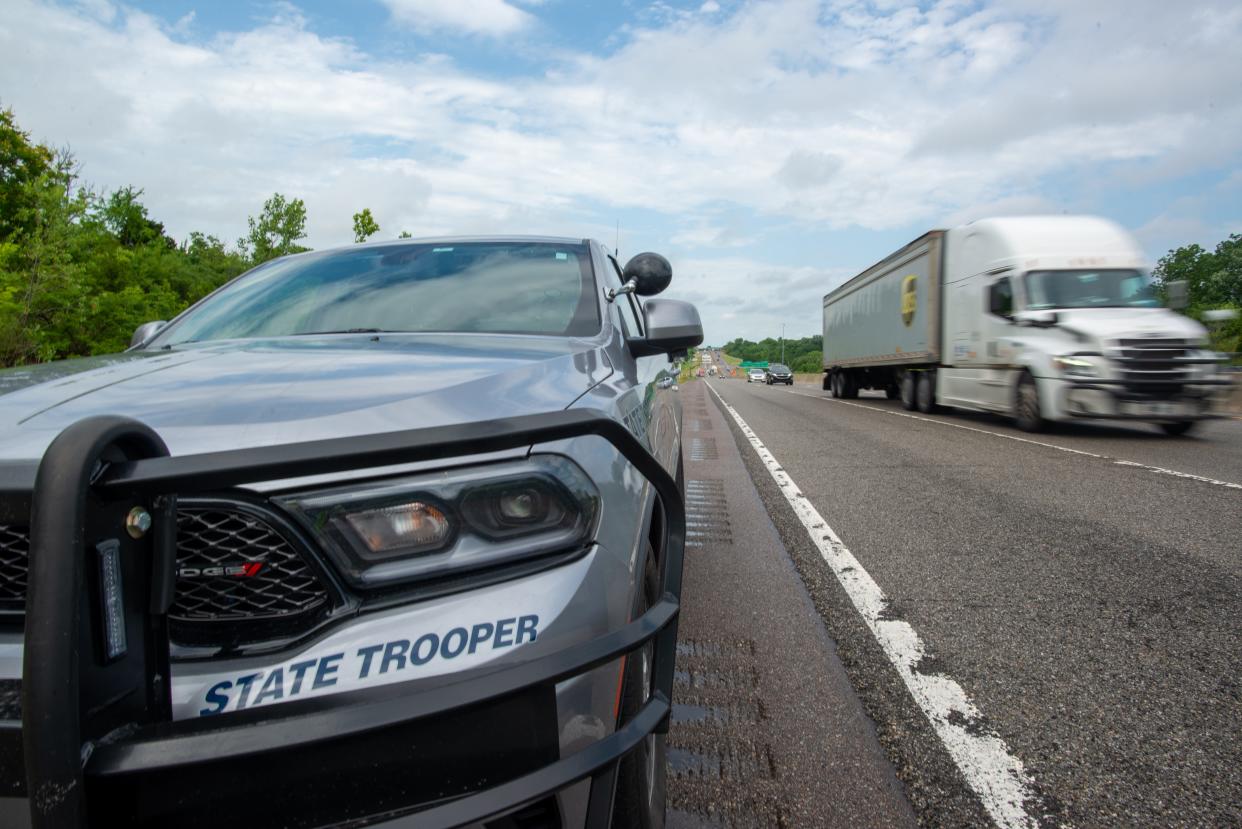Federal judge orders permanent injunction against Kansas Highway Patrol two-step policy
A federal judge entered a permanent injunction against the Kansas Highway Patrol on Monday, ordering state troopers to stop detaining motorists without reasonable suspicion.
Monday's order formalizes what U.S. District Judge Kathryn Vratil had proposed in July, after which she gave both sides time to provide input on the details of the injunction.
"The Kansas Highway Patrol is not above the law," said Sharon Brett, the ACLU legal director. "While KHP made various attempts to side-step accountability for its practices and put off this injunction, the Constitution has prevailed."
The ACLU represented plaintiffs who sued individual state troopers and former KHP Superintendent Herman Jones.
A spokesperson for the Highway Patrol, which was represented by the Kansas Attorney General's Office, declined to comment and referred questions to the attorney general's office. A spokesperson for that office didn't immediately respond to a request for comment.
The highway patrol had argued the injunction is too burdensome.
Vratil previously ruled that the Highway Patrol was violating the Fourth Amendment, which guarantees a constitutional protection from unreasonable searches and seizures by the government.
"Defendant was responsible for a policy or practice which unlawfully detains motorists in Kansas (especially out-of-state motorists) without reasonable suspicion or consent, based on out-of-state residency and — to more than a minimal extent — based on travel plans that are not implausible or inherently contradictory," Vratil said.
She added that "defendant was responsible for a policy or practice of using the Kansas Two-Step to extend traffic stops of motorists in Kansas without reasonable suspicion and without the motorists' knowing, intelligent and voluntary consent."
Injunction will protect drivers in Kansas against illegal KHP searches

The injunction applies to any driver or passenger on I-70, I-35, U.S. 54 or U.S. 36 in Kansas who is or appears to be traveling to Colorado in a vehicle with an out-of-state license plate, as long as the person is not convicted of a crime arising from a vehicle stop, detainment and search by KHP.
The injunction requires documentation of all investigatory stops, meaning "any traffic stop in which a trooper detains a vehicle and its occupants to initiate inquiry into a traffic violation."
The patrol must also create and maintain a log of every time a trooper tries "to re-engage a driver or occupant of a vehicle for additional questioning following an investigatory stop." The log must include the trooper who made the request, the response received and any resulting action.
The logs and a report summarizing the data must be submitted to the federal court for the judge's review every calendar quarter. They will be available to the public. The first report will cover the 90-day period following the effective date of the injunction and will be due 30 days afterward.
"Such a requirement is necessary and appropriate to implement the terms of the injunction and ensure KHP compliance," Vratil said of the logs.
The provision targets a KHP practice known as the Kansas Two-Step, in which troopers would start to walk away after finishing a traffic stop, but then turn back for additional questioning. The state had argued that the second interactions were voluntary. Drivers who refused vehicle searches would sometimes be detained for a drug dog sniff search.
Troopers must now use a form to document vehicle detentions. In it, they must describe the reasonable suspicion factors. If a dog is used, they must also attach a copy of any K-9 unit deployment reports.
The patrol had objected to being required to include any K-9 reports, arguing that outside agencies, such as local police departments and sheriff's offices, are often used to conduct the canine sniff searches. They contended that "it is possible" those agencies will refuse to provide reports to the KHP. Vratil rejected that "unsupported hypothesis."
Vratil said the K-9 reports are "necessary to address the Fourth Amendment violations by extending traffic stops to conduct a canine sniff and ensure KHP compliance with the other terms of the injunction."
Attorney general's office blamed understaffing for late filing
While it didn't ultimately affect the outcome, the judge did note that the lawyer from the attorney general's office representing the Highway Patrol missed a filing deadline earlier this month by about 10 hours.
The filing was necessary for Vratil to resolve differences between the ACLU and KHP on the final text of the injunction. The document that was supposed to be filed by 5 p.m. on Nov. 9 wasn't filed until 3:22 a.m. Nov. 10.
Assistant attorney general Stanley Parker said negotiations had continued until they broke down about two hours before the deadline. He also blamed a staffing shortage in the attorney general's office.
"Due to retirements, promotions, transfers, and resignations, defense counsel's office continues to experience a severe staffing shortage," Parker said. "Over half of the attorney positions in the Civil Litigation Division are vacant. When an attorney leaves, the workload for those remaining increases in order to handle the cases previously assigned to that attorney."
Parker also said his secretary and legal and administrative assistant was promoted in late October, leaving him without any support staff.
Vratil allowed the late filing but said Parker had "a poor excuse."
More: Kansas Attorney General's Office fighting exodus. Can Kris Kobach turn it around?
Jason Alatidd is a statehouse reporter for the Topeka Capital-Journal. He can be reached by email at jalatidd@gannett.com. Follow him on X @Jason_Alatidd.
This article originally appeared on Topeka Capital-Journal: Federal judge orders injunction against Kansas Highway Patrol policy
